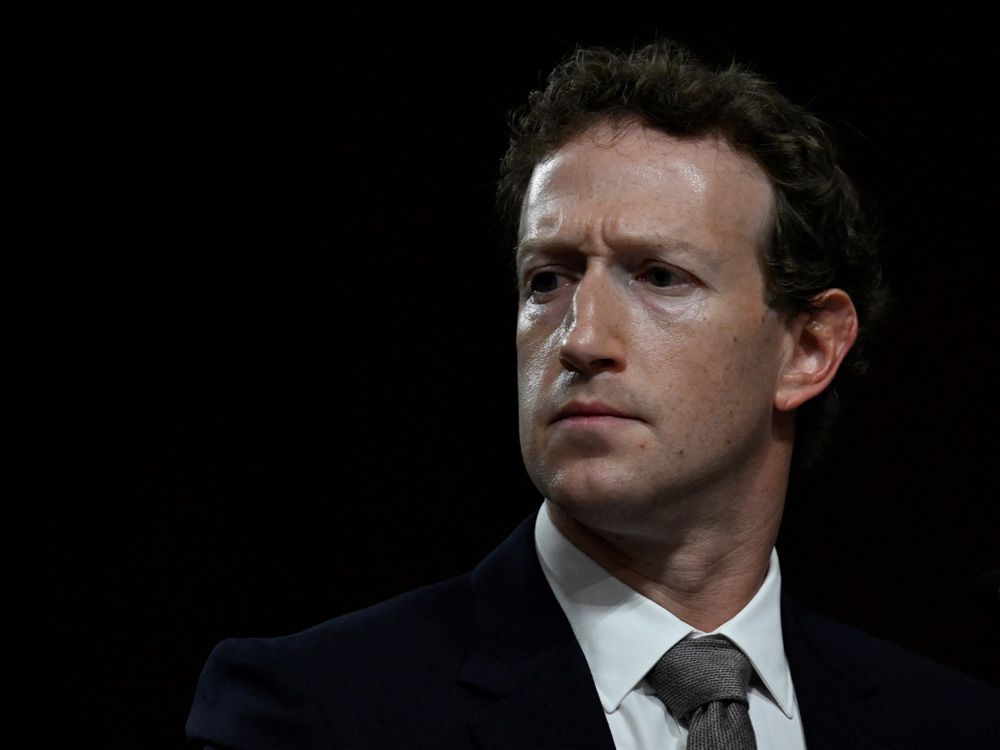Times are good in Windsor, Ont. — the portal through which a quarter of our trade with the United States flows. But all that could change with a stroke of the presidential pen
Article content
Peter Piazza didn’t set out in life to become the chief executive of a family-owned cheese company in Windsor, Ont., but his fate, both in marriage and career path, was sealed when life put him in front of Joe Galati’s daughter Franca some 40 years ago. “Joe,” as Piazza’s father-in-law is known around town, is the founder of the Galati Cheese Co. Ltd.
Article content
Article content
If you have ever found yourself in the Canadian border town directly across the river from Detroit and had a hankering for some Windsor-style pizza, which, as far as food items go, inspires near-religious devotion amongst the locals and has achieved a degree of national renown in foodie circles, the pizza was most assuredly topped by Galati’s mozzarella, famously made with pure milk sourced from nearby dairy farms.
Advertisement 2
Article content
In Piazza’s early years with the company, there were eight employees. Everyone did every job, from making and packaging the cheese to selling the cheese and making deliveries. Galati has 24 employees today, and the guy who married the boss’s daughter way back when is now the boss himself.
Piazza oversaw the family-owned company’s majority purchase by Kirtland Capital Partners LLC, a Cleveland-based private-equity firm, in 2023. The master plan going forward is to grow Galati’s market reach beyond the regional Canadian pizza scene it already dominates and perhaps take a nibble out of the Detroit pizzeria business on the Michigan side of the Ambassador Bridge.
Article content
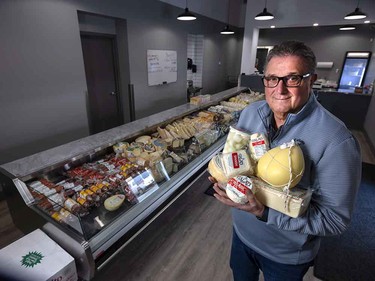
But expansion wasn’t what was eating at Piazza’s mind on a chilly morning in mid-January. As famous as Windsor is for its pizza, it is even more renowned as a manufacturing hub, with deep ties to the automobile industry, including the NextStar Energy Inc. battery plant that has just come online and is expected to employ 2,500 workers once fully operational.
More than 42,000 area residents work so-called blue collar jobs, giving the city its feisty and resilient sense of pride. That scrappiness was sorely tested during the great financial crisis in 2008, when the major automakers teetered on the edge of oblivion and mass layoffs rippled across the city. Windsor’s unemployment rate topped 16 per cent. Money grew tight. Families cut back on spending — some moved away altogether — and people stopped ordering pizza.
Advertisement 3
Article content
“Those were hard times for our town,” Piazza recalled.
Any tariffs could mean job losses, and if people around town start losing their jobs, there is going to be a trickle-down effect. I sure hope Trump is bluffing
Peter Piazza, Galati Cheese Co.
Locals have not forgotten them, so when Donald Trump talks about imposing 25 per cent tariffs on Canadian goods, and “America First,” Windsorites start reliving some nightmarish memories and harbour a healthy fear of the future should a tariff-driven trade war eventually erupt between the two countries.
“If people were to visit our town and see the Ambassador Bridge, with all those trucks going back and forth across it each day, I tell you, it is a parade,” Piazza said. “Any tariffs could mean job losses, and if people around town start losing their jobs, there is going to be a trickle-down effect. I sure hope Trump is bluffing.”
If a trade war gets fought, it is going to be places such as Windsor on the frontlines — not Ottawa or Washington D.C. The city is tethered to the United States by a 96-year-old, Art Deco-style, American-owned 2.3-kilometre-long suspension bridge spanning the Detroit River.
About a quarter of the annual trade between Canada and the U.S. traverses the mostly steel bridge; a cargo borne by 2.75 million trucks, each carrying, well, you name it: auto parts, computers, pet food, pharmaceuticals, agricultural products, electronics, iron, steel and the like. This great exchange between neighbours was valued at US$8.5 billion in November alone.
Advertisement 4
Article content
Article content
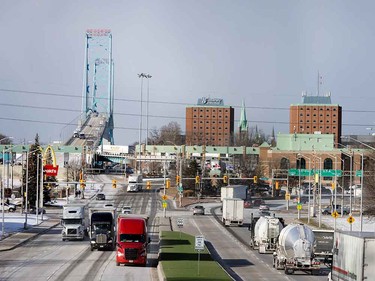
Busy days at the border make for bad traffic days in Windsor. Trucks back up at a standstill along Huron Church Road, the six-lane gateway to the bridge that acts as a rolling visual barrier cutting west Windsor off from the rest of the city.
Mixed amongst those trucks are the human commuters, including an estimated 2,000 Canadian nurses who cross the bridge from their Canadian homes to work in Michigan hospitals and health-care centres. Stories of an American girl meeting a Canadian boy and the rest becoming history are common at supper tables on both sides of the border, further underscoring a bond through commerce, life and love, perhaps best captured by the well-tread line among Windsorites, proud Canadians though they are, that the city of 300,000 might fairly be mistaken for a suburb of Detroit.
Joining the privately held Ambassador Bridge on the border scene at some point later this year will be the Gordie Howe International Bridge, jointly owned by the Canadian federal and Michigan governments.
Structurally designed to reflect the curve in a hockey stick, the $6.4-billion monument to trade is practically intended to divert a significant percentage of the north-south flow of trucks, goods and people away from its overburdened centenarian competitor. Among those counting down the days until it is game on for the Gordie Howe is Fabio Costante.
Advertisement 5
Article content
He has three degrees from the University of Windsor, a campus that sits in the shadow of the old bridge, as do portions of the city’s Ward Two, which the 40-year-old lawyer and city councillor has represented since 2018.
Article content
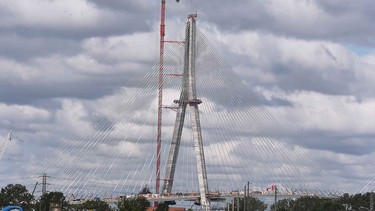
A self-professed “soccer guy” and season ticket holder to Detroit City FC, Costante regularly zips between countries to attend games during the warmer months. In his legal line of work, there are any number of law firms doing business on both sides of the border, and any number of area businesses and employees doing the same.
“It literally takes me five minutes to get from where I live to Detroit,” he said.
Convenience, alas, doesn’t connote affection for the bridge and the traffic chaos it creates. Costante hopes the new bridge will divert traffic elsewhere and give his ward an opportunity to stitch itself back together again.
In sum, he is bullish about his constituents’ prospects, and not just because of the new bridge, the new battery plant and all the spinoff jobs it is expected to generate, but due to the general vibe about town.
It can be tough for an outsider to imagine just how crippling of a gut punch the great financial crisis was for the city. At the time, Costante was a student and the conversations he had with his peers concerned their dismal job prospects.
Advertisement 6
Article content
But Windsor didn’t bounce back when other parts of the country did. Today, though, there is a sense of positive momentum, and the economic indicators point to even better days ahead, a sunny horizon that Trump could potentially blot out at the stroke of a pen.
You could do everything right as a city, but then a decision could get made by the president of the United States that could impact all the hard work that has been done here
Fabio Costante, Windsor city councillor
“You could do everything right as a city, but then a decision could get made by the president of the United States that could impact all the hard work that has been done here over the last decade or two, and from that perspective, it is an all-hands-on-deck moment,” Costante said.
It is the feeling of will he or won’t he, and when and what exactly will Trump do that has the border town and the entire country on edge.

Simon Sherry, a psychologist at Dalhousie University in Halifax, has no expertise in matters of trade, but he knows a good case of national anxiety when he sees one. What he has been seeing lately is business folks walking around with a bad case of the jitters brought on by Trump’s tariff threats.
Perhaps the president is bluffing, but perhaps he isn’t. Sherry said it would be unethical for him to assess Trump’s personality, but he has authored papers on narcissism and can speak generally on how others can deal with it.
Honk if this sounds familiar. A narcissist possesses a grandiose sense of self and is prone to jealousy and fits of rage, particularly when things don’t go their way. Upon first meeting, they may present as likable, but it will become clear in time that “they don’t play nicely with others,” especially should someone “invalidate their superior sense of self,” Sherry said.
Advertisement 7
Article content
Should you find yourself in Windsor and be fretting over how tariffs would be bad for everybody — Americans included — by driving up the costs of consumer goods north and south of the border and potentially triggering a continental recession, Sherry recommends recognizing “that you have a choice not to get pulled into the drama, and that can be difficult, because narcissistic people can elicit from us very negative responses.”
The best reaction when someone like that takes to social media is not to react at all, he said. If you, your company or your industry have a bit more economic heft than the average cheese maker and wind up on the other side of a hypothetical bargaining table from a hypothetical narcissist, try to tap into their sense of empathy and give their ego a good stroke by whispering sweet nothings in their ear about how wonderful they are. You might also want to mention how wonderful free trade is and that by maintaining and perhaps enhancing the relationship, all parties emerge as winners and, importantly, Canadians would be forever grateful.
A narcissist needs your respect, your recognition — your attention — and they’re going to want validated a sense of powerfulness, brilliance, beauty or some other form of specialness
Simon Sherry, psychologist, Dalhousie University
“With their puffed-up sense of self, a narcissist needs your respect, your recognition — your attention — and they’re going to want validated a sense of powerfulness, brilliance, beauty or some other form of specialness,” Sherry said.
Advertisement 8
Article content
There are always trade-specific facts Canadians can fall back on. The first, loosely paraphrased, might be boiled down to: If it ain’t broke, then don’t tariff it. For example, free trade in auto parts between Canada and the U.S. has existed since 1965. The average car, and parts thereof, crosses the border eight times before it is fully built and ready for the showroom floor.
Some of those parts crossing the Ambassador Bridge are manufactured by Martinrea International Inc.’s factory in Tillsonburg, Ont. The Canadian auto-parts maker also has factories and nearly 4,500 employees in the U.S. and another 9,000 workers in Mexico.
“Our factory in Tillsonburg supplies a lot of stuff for Michigan, and we have a factory in Michigan that is providing stuff for factories in Ontario,” Rob Wildeboer, the company’s founder and executive chair, said. “When I am in the U.S., I remind them, ‘We’re American.’”
He was recently in Mexico City meeting with President Claudia Sheinbaum Pardo at the National Palace. His message for her, and at every stop in recent months, has been that free trade in auto parts has been good for all three countries, and the partners need to continue to work together. He can’t think of anybody in the auto industry who disagrees.
Advertisement 9
Article content

“I don’t even know how you would tariff the auto industry because we have parts crossing the border all the time,” he said.
He added that 2025 “isn’t our first rodeo,” before offering a brief history lesson. Recall the Americans closed their borders after the Sept. 11, 2001, terrorist attacks, even to their pals up north. General Motors Co. executives in Detroit went to Washington and in Wildeboer’s retelling they said, “Guys, you don’t understand; if you shut this border, our industry shuts down within a week.” Lo and behold, the border reopened. Cars got made.
During the great financial crisis, the conversation again involved how the two countries made cars together. The united-we-stand position produced a US$94-billion, joint, Canada-U.S. government bailout package that rescued General Motors and what was then known as Chrysler LLC. The Americans put up US$80 billion of the total. Private-sector money was also found for Ford Motor Co.
In the more recent past, Wildeboer was party to the negotiations that produced the U.S.-Mexico-Canada Agreement, which came into force on July 1, 2020. Like he said, this is not his first rodeo.
“There is a strong contingent within our industry who believe in a fortress North America, buttressed against other parties’ strategy,” he said.
Advertisement 10
Article content
There is a strong contingent within our industry who believe in a fortress North America, buttressed against other parties’ strategy
Rob Wildeboer, founder, executive chair, Martinrea International
The other party, singular, refers to China. Canada followed the Americans lead by imposing a 100 per cent tariff on Chinese-made electric vehicles last year, the same year that China invested a reported US$2.72 billion in Mexico’s automotive sector.
Chinese cars accounted for 20 per cent of new vehicle sales in Mexico in 2024. With the cars has come Chinese parts makers and a real threat, according to Wildeboer, that a Chinese state-owned enterprise could start “dumping” cheap, state-subsidized parts into the Canada-U.S.-Mexico free market and upset what has been a mutually beneficial relationship to date.
“We would not permit dumping with hockey pucks and we shouldn’t permit it with auto parts,” he said.
In short, there is work to do, but the bad guys aren’t Canada or Mexico, and when dealing with Trump, it is important to remember that a “tweet does not a tariff make,” Wildeboer said.
Tariff threats, and what Trump will or won’t do, aren’t what keeps Ted Daniel, the co-founder and chief executive of Titanium Transportation Group Inc., awake at night.
Article content
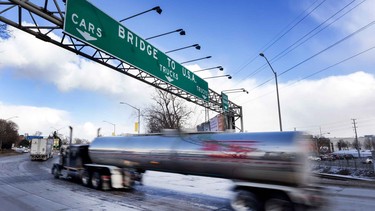
An accountant by training, Daniel and his wife Marilyn cofounded the trucking business in 2002. The numbers guy even got his trucking licence to better understand the drivers’ perspective. Over the past two decades, a startup that began in one room has grown into an industry player with 650 trucks on the road in Canada and another 150 based in the U.S.
Advertisement 11
Article content
Some of those trucks cross the Detroit-Windsor border carrying all manner of consumer goods. Should a percentage of those goods become subject to tariffs and traffic were to slow, the company, because of its diversified loads, plans to focus on goods that aren’t heavily tariffed and simply keep on trucking.
Besides, the industry has bigger existential headaches than Trump. Chiefly, rock-bottom freight prices. Trucking is a fragmented industry. During the pandemic, consumers went bananas when the world shifted from in-office to remote work and bought everything from new computers to backyard trampolines.
The spike in consumer demand spelled opportunity in trucking. A wave of startups piled into the industry, but consumer demand has since normalized and the industry has gone from making hay during the good times to having too many trucks on the road with not enough loads to fill them. Freight prices that were at all-time highs a few years back are now at all-time lows.
“It is supply and demand economics, and more and more and more companies kept entering the market, but eventually things slowed down,” Daniel said.
Several Canadian enterprises, including 75-plus-year-old McKevitt Trucking Ltd., Pride Group Logistics Ltd. and True North Freight Solutions Inc., have either closed shop outright or else filed for bankruptcy protection, and the attrition phase of a boom-gone-bust is ongoing.
Advertisement 12
Article content
“It has been an extremely challenging environment,” Daniel said.
But the trucks are still rolling through Windsor and some of the drivers, no doubt, pop into town for a slice of Windsor-style pizza before getting on their way.
Corrie Menary is a recent convert to the city’s famous culinary fare. If she has a favourite pizzeria in town, she is not about to say, but she is the partner at Kirtland Capital in charge of the Galati cheese file. Her firm bought into the family company because “cheese is a product that isn’t going anywhere.”
Having a lock on the Windsor market was another selling point, and being able to significantly grow beyond it is the hope. Pizza, unlike steak, tends to be within reach of most consumers’ budgets, even in tougher economic cycles when folks are being watchful of their pennies. In this analysis, Galati presented as a stable investment opportunity.
Now, along comes the potential for instability. Menary, like the cheese guys in Windsor, and so much of the world, is watching what Trump will do next, and she is scratching her head over the wisdom of tariffs. By her math, targeting Canada with tariffs simply doesn’t add up, and it could produce a recessionary blowback for her American neighbours.
Advertisement 13
Article content
“I sort of look at it as, ‘What did Canada do to deserve this?’” she said. “You are a relatively small population country that we benefit from being neighbours with, and U.S.-based businesses benefit from tons of economic activity between the two countries. It just seems very misguided, in my opinion, to lump Canada into some of the other beefs that Trump has globally.”
Back in Windsor, all seemed well on day two of Trump’s second term in office. The lunch rush was just picking up steam around some of the local pizza joints as a slew of trucks crawled along Huron Church Road toward the bridge and beyond, while a similar tide of vehicles inched across the Canadian frontier.
Peter Piazza had a meeting at Galati’s headquarters with an out-of-town visitor. The wheels of commerce were turning. The famous mozzarella was being made.
“It is all about the job market in our city,” Piazza said. “And today, times are good.”
• Email: joconnor@postmedia.com
Bookmark our website and support our journalism: Don’t miss the business news you need to know — add financialpost.com to your bookmarks and sign up for our newsletters here.
Article content
Trump tariff threats spark fear on Canada’s border
2025-01-23 15:12:10



